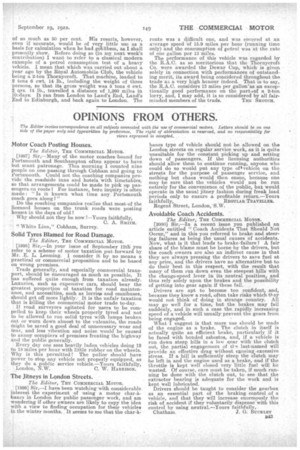OPINIONS FROM OTHERS.
Page 27

If you've noticed an error in this article please click here to report it so we can fix it.
Motor Coach Posting Houses.
The Editor, TE COMMERCIAL MOTOR.
[ EL [ EL
1997] Sir,—Many a the motor coaches-bound for Portsmouth and Southampton often appear to have but scant patronage. This morning I counted nine people on one passing through Cobham and going to _Portsmouth. Could not the coaching companies provide the roadside inns and hotels with timetables, so that arrangements could be made to pick up passengers en routel For instance, here inquiry is often made: "Is it known what time any. Portsmouth coach goes along?"
Do the coaching companies realize that most of the licensed houses on the trunk roads were posting houses in the days of old ?
Why should not they be now '/---Yours faithfully, C. A. SMITE. " White Lion," Cobham, Surrey.
Solid Tyres Blamed for Road Damage.
The Editor, THE COMMERCIAL MOTOR.
[1996] Sir,—In your issue of September 12th you refer to a scheme of motor taxation put forward by Mr. E. L. Leenaing. I consider it by no means a practical or commercial proposition and to be based on wrong premises.
Trade generally, and especially Commercial transport, should be encouraged as much as possible. it has suffered quite enough from taxation already. Luxuries, such as expensive cars, should bear the greatest proportion of taxation for road maintenance and necessities, such as lorries and omnibuses, should get of more lightly.It is the unfair taxation that is killing the commercial motor trade to-day. . If road surveyors agitated for users to be compelled to keep their wheels properly tyred and not to be allowed to run solid tyres with lumps broken out or worn down almost to the vulcanite, the roads might be saved a good deal of unnecessary wear and tear, and less vibration and noise would be caused to annoy occupiers of premises fronting the highway and the public generally.
Every day one sees heavily laden vehicles doing 12 to 16 miles per hour with little rubber on the wheels. Why is this permitted? The police' should have power, to stop any vehicle not properly equipped, as they d.o a public service vehicle.—Yours faithfully,
London, N.W. C. W. HARRISON.
The Jitneys in London Streets.
The Editor, THE COMMERCIAL MOTOR.
[1999] Sir,—I have been watching with considerable interest the experiment of using a motor char-be banes in London for public passenger work, and am wondering if other owners are likely to copy the idea with a view to finding occupation for their vehicles in the winter months. It seems to me that the char-h
banes type of vehicle should not be allowed on the London streets on regular service work, as it is quite unsuitable for the constant picking up and setting down of passengers. If the licensing authorities should allow them to continue running, anyone who could do so would put any type •oftvehicle on the streets for the purpose of passenger service, and nothing but chaos would then ensue, because one may be sure that the vehicles would not be run entirely for the ebnvenience of the public, but would operate in the usual jitney fashion during freak load periods only to ensure a profitable return.—Yours
faithfully, REGULAR TRAVELLER. Regent Street, London, S.W.
Avoidable Coach Accidents.
The Editor, THE COMMERCIAL MoTent.
[20001 Sir,--In a. recent issue you published an article entitled "Coach Accidents That Should Not Occur," and in this you referred to brake and-steering failures as being the usual causesof accidents. Now, what is it that leads to brake-failure ? A fair share of the blame must be borne by the drivers, but the coach owners are also an indirect cause in that they are always pressing the drivers to save fuel at any price, and the drivers have no alternative but to do their best in this respect, with the result that many of them run down even the steepest hills with the change-speed lever in its neutral position, and thus rely solely upon the brakes and the possibility of getting into gear again if these fail.
Drivers .are apt to become too confident, and, because they know a road, often take risks which they would not think of doing in strange country. All may .go well for a time, but the brakes may fail suddenly, and in such a case the rapidly increasing speed of a vehicle will usually prevent the gears from being engaged. What suggest is that more use should be made of the engine as a brake. The clutch in itself is actually quite an efficient brake, particularly if it be faced with bonded asbestos, and, if a vehicle is run down steep hills in a loai gear with the clutch out, the partial engagement cpf ti-e last-named will provide an effective drag without causing excessive stress. If a hill is sufficiently steep the dutch may be left in and the engine used as a brake, and if 'the throttle is kept well closed very little fuel will be wasted. Of course, care must be taken, if much running be done -with the clutch out, to see that the extractor bearing is adequate for the work and is kept well lubricated.
Drivers should be taught to consider the gearbox as an essential part of the braking control of a vehicle, and that they will increase enormously the risk of accident if they voluntarily dispense with this control by using neutral.—Yours faithfully, Chatham. J. G. BUCKLEY






























